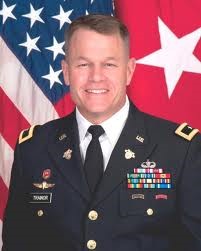 Brigadier General Timothy E.docx
Brigadier General Timothy E.docx

Brigadier General Timothy E. Trainor
Dean of the Academic Board
U.S. Military Academy, West Point
Brigadier General Timothy E. Trainor, Ph.D., is the 13th Dean of the Academic Board at West Point. Brigadier General Trainor's former position was Professor and Head of the Department of Systems Engineering at the United States Military Academy.
Brigadier General Trainor graduated with a Bachelor of Science degree from USMA in 1983 and entered the Engineer Branch of the US Army. As an engineer officer, he served in operational assignments around the world to include Germany, Honduras, Fort Bragg, North Carolina, Fort Riley, Kansas and Sarajevo, Bosnia.
Brigadier General Trainor deployed to Basrah, Iraq in the summer of 2007 and worked with the UK-led Provincial Reconstruction Team in helping the provincial Iraqi leaders improve their infrastructure revitalization plans.
Brigadier General Trainor has an MBA from the Fuqua School of Business at Duke University and a Ph.D. in Industrial Engineering from North Carolina State University. He is a member of the Military Applications Society of the Institute for Operations Research and the Management Sciences, the Military Operations Research Society, the American Society for Engineering Management and the American Society of Engineering Education. He is a Past President of Epsilon Mu Eta, the National Engineering Management Honor Society.
Brigadier General Trainor currently serves on the Board of Fellows for the David Crawford School of Engineering at Norwich University. He teaches courses in engineering management, systems engineering and decision analysis. As an analyst, Brigadier General Trainor helped develop the Installation Status Report that provides the Army a standardized means to assess infrastructure and environmental conditions on installations to support resource allocation decisions. Brigadier General Trainor has applied decision analysis methods in completing an organizational analysis of the Army's Installation Management Agency and in assessing defense security cooperation programs.
 Word document
Word document- 26.79 KB
- 223 downloads
- Download
- PDF version
- Printer-friendly version
